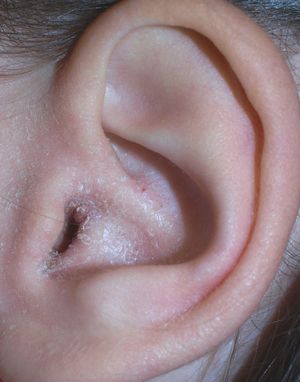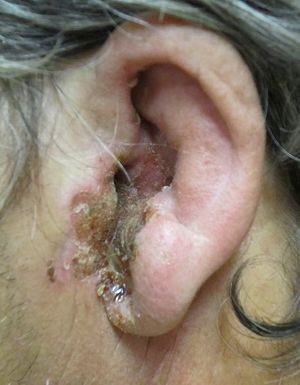We need you! Join our contributor community and become a WikEM editor through our open and transparent promotion process.
Otitis externa
From WikEM
Contents
Background
Microbiology
- Pseudomonas (most common)
- Staph/Strep
- Enterobacter
- Proteus mirabilis
- Fungus (may present after antibiotic treatment)
Risk Factors
- Swimming
- Excessive Q-tip use
Clinical Features
- Rapid onset (generally within 48 hours) in the past 3 weeks, AND.[1]
- Symptoms
- otalgia (often severe)
- itching, or fullness, WITH OR WITHOUT
- hearing loss or jaw pain AND...
- Signs
- tenderness of the tragus, pinna, or both OR
- diffuse ear canal edema, erythema, or both WITH OR WITHOUT
- otorrhea
- regional lymphadenitis
- tympanic membrane erythema, or
- cellulitis of the pinna and adjacent skin
Differential Diagnosis
Ear Diagnoses
- External
- Auricular hematoma
- Cholesteatoma
- Contact dermatitis
- Ear foreign body
- Herpes zoster oticus (Ramsay Hunt syndrome)
- Malignant otitis externa
- Mastoiditis
- Otitis externa
- Otomycosis
- Tympanic membrane rupture
- Internal
- Acute otitis media
- Bullous myringitis
- Chronic otitis media
- Mastoiditis
- Otic barotrauma
- Inner/vestibular
Evaluation
- Normally clinical
Management
Hygiene
- Clean the ear canal (Grade C)
- Cerumen wire loop or cotton swab usually works best
- 1:1 dilution of 3% hydrogen peroxide if tympanic membrane is visible and intact
- Place a wick if the ear canal is fully obstructed
Analgesia
Prevention
- Keep ear canal dry
- Abstain from water sports for 7-10 days
Antibiotics
- Floxin Otic: 5 drops in affected ear BID x 7 days[1]
- Safe with perforations
- Cipro HC Otic: 3 drops in affected ear BID x 7 days
- Contains hydrocortisone to promote faster healing
- Not safe with perforation
- CiproDex: 3 drops in affected ear BID x 7 days
- Similar to Cipro HC but contains Dexamethasone
- Also not recommended with perforations
- Cortisporin Otic (neomycin/polymixin B/hydrocortisone)
- 4 gtt in ear TID-QID x 7dy
- Use suspension (NOT solution) if possiblity of perforation
- Animal studies suggest possible toxicity from the neomycin although rigorous data is lacking[2]
Disposition
- Follow up in 1-2wks for patients with moderate disease
See Also
External Links
References
- ↑ 1.0 1.1 Clinical Practice Guideline: Acute Otitis Externa Executive Summary. Otolaryngology -- Head and Neck Surgery 2014 150: 161 DOI: 10.1177/0194599813517659 PDF
- ↑ Wright, C. et al. Ototoxicity of neomycin and polymyxin B following middle ear application in the chinchilla and baboon. Am J Otol. 1987 Nov;8(6):495-9.


